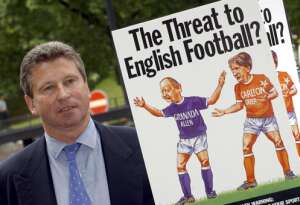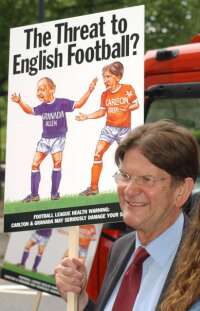|
This summer, however, there has been no rumour or gossip. Instead, football has found itself more at home on the front pages of the press than on the back. Instead of speculation about the movements of various players, the news has been of financial crises, legal wrangles and boardroom angst. The world cup, which was itself blighted by conspiracy theories and under performing star names, seems an age ago.
Unusually, the football league has dominated the headlines, with the premiership relegated to secondary billing for all but a brief period as the Rio Ferdinand transfer saga reached its climax. Indeed, so deep has football’s financial uncertainty run that Ferdinand remains virtually the only high profile transfer of the summer, although Liverpool Manchester City and Middlesborough fans might quibble with that.
In normal circumstances, this would be immensely satisfying to those fans who follow the Football League, but who have been frustrated by the continuing hype which surrounds the Premiership and consigns the Nationwide league clubs to the shadows. But this has not been a normal summer. Instead, the focus has been squarely upon the boardroom, and the farcical dealings in that department.
Indeed, such has been the comical level of ineptitude shown by league chiefs throughout the last twelve months that it would be no surprise if David Burns and Keith Harris were replaced in their respective roles by Bertie Bee and the Deepdale Duck. The league has lurched from one disaster to the next over the past year - starting with the Phoenix League debacle where the football league failed to take a decisive lead, and ending with the failure of the league’s court case - rudderless and with a void at the top where leadership should have been.
And though the Chairman and Chief Executive have been the fall guys, culminating in their inevitable resignations, much of the blame that has been placed upon them is a little unfair. True, they have not provided the sense of direction or created the sense of unity between clubs necessary in order to adequately cope with the stresses of the collapse of ITV Digital. True also, the attempts to publicise the league’s case with demonstrations and petitions were pathetic. But they did not preside over the signing of the deal and the omission of a crucial guarantee, and many of the league’s internal difficulties are a product of the egotistic, self-interested chairmen of many clubs within the first division who have squabbled persistently since the crisis first came to light. In the last week, Theo Paphitis of Millwall and Simon Jordan of Crystal Palace have been vociferous critics of the court case brought by the league against Carlton and Granada – yet these characters, along with the likes of Paul Scally and the self-obsessed Geoffrey Richmond, were among the most bullish chairmen who insisted the TV companies would be brought to justice back in April.
This type of self-publicity is precisely why the football league has turned into one of the worst run organisations in Britain, and with so much back-stabbing and in-fighting, it matters not a jot whether a successful city executive such as Keith Harris or a mascot is placed in the boardroom, since these self important individuals are becoming impossible to control. There is, furthermore, no evidence that many of the first division chairmen would do a better job of leading the league, given their record in keeping their own clubs finances in order, or in the case of Paphitis, his club’s supporters.
Instead, these are the chairmen who would happily cast away the smaller clubs in the lower division with a healthy disregard for the overall well being of the game, in order to gain a bigger slice of the TV cake and secure their own club’s futures despite their mismanagement. Should these chairmen succeed in their quest to gain control of the Football League, the damage to the game would be far greater than any misdemeanour perpetrated by Harris or Burns. Despite the failure of the court case last week, the judge’s summation may have ensured the league has a real case against the lawyers who oversaw the signing of the original document, yet two of the characters who would deserve some credit for achieving a success in any future courtcase have been thrown to the dogs without a shred of decency.
|
As a result, there have been no rumours, no signings, and little prospect of any new faces in the near future. Only a handful of names have been linked with Turf Moor, all free transfers, but only Marlon Broomes and Marlon Beresford have even trained with the Clarets. The trend is repeated throughout Division One – only Preston and Portsmouth have spent significant sums of money, and roughly half the division have followed ourselves in releasing players but not replacing them. Even Wolves, who have never been shy of spending Sir Jack Hayward’s personal fortune, have been conspicuously quiet in the transfer market.
All this means that the same faces will line up against Brighton on Saturday, and that replacements will be considerably thinner on the ground than a year ago. It also means that there is less excitement surrounding the beginning of the season than usual: the close season is usually a change from the reality of football, a time when names are linked with moves to the club on an almost daily basis, some of them exotic names which have little chance of ever putting pen to paper at Turf Moor. That doesn’t really matter; it provides an opportunity to dream, reassurance that the club is moving in the right direction. Even though the eventual arrivals are rarely so mouth-watering, they are at least intriguing and add a spice to the opening day of the season which will be absent this time around. There seems to be less anticipation surrounding this year than ever before.
Burnley will probably be safe from relegation, although there does not appear to be the depth of talent within the squad – particularly in central midfield, where only Tony Grant and the ageing Paul Cook are specialists with Paul Weller and Lee Briscoe likely to be in the frame as regulars in that position – to sustain even a play off push this time around. Nevertheless, although they are not all immediately obvious , there are various points of interest surrounding the squad. With less cover across the board, youngsters like Dimi Papadopoulos, Brad Maylett, Tony Shandran and Earl Davis may get more opportunities this year. For Maylett and Shandran in particular, this may represent a last chance to impress at the club after a couple of years around the fringes of the first team. If they do not make an impact this time around, then it is fair to say that they are unlikely to ever do so. With the squad now cleared of much of the deadwood that had built up since promotion two years ago, the club will be in a healthy position from which to begin to build again, particularly if the league does re-coup some of its losses from the lawyers. If, however, the worst case scenario does become a reality and the clarets begin to flirt with the lower reaches of the division, Barry Kilby will have to make a tough decision over whether he is prepared to open the chequebook to stave of any threat of a dogfight, or instead risk relegation and the untold financial disasters that would result in. In that case, Kilby’s cautious financial policy would look distinctly unsound.
Football does not live by normal economics. It will survive; this summer may be looked upon in the future as a watershed which gave the game the shock it needed to put it’s house in order and return to it’s roots. Maybe supporters will come out of this in a stronger position from which to ensure that their interests are not marginalized by the commercial machine which has coloured the game’s thinking in the past few years. But to hell with the politics – we’ve had enough of them to last a lifetime. Lets get back to the action. That is, at the end of the day, what this great game is all about.


